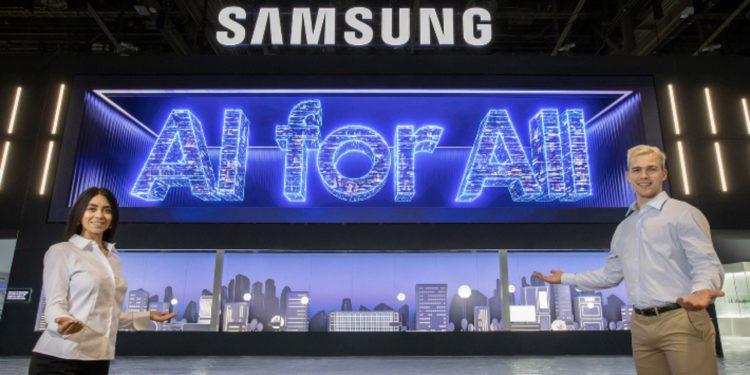Samsung Electronics Co. revealed its outlook for the technological landscape, unveiling a spectrum of artificial intelligence-driven innovations and sustainability at CES 2024. The company declared ‘AI for All,’ presenting a future where artificial intelligence seamlessly integrates into customers’ daily lives, fostering innovation and transformative experiences.
Participating in CES 2024, the largest electronics exhibition globally, held in Las Vegas, USA, from the 9th to the 12th (local time), Samsung Electronics has curated a showcase within the convention center spanning 3,934 square meters – the most substantial among all participating companies.
In this expansive exhibition, Samsung has emphasized ‘Sustainability’ and the ‘SmartThings Ecosystem,’ concurrently introducing a myriad of AI-based innovations and technologies.
Samsung Electronics unveiled next-generation screen products at the event. Among the notable innovations highlighted are the Neo QLED 8K TV and the NQ8 AI Gen3 Processor, promising heightened speeds and an improved neural network.
The TVs featured at the event will come equipped with the Samsung Daily+ function, providing users with a comprehensive overview of content and information, including popular titles and recently viewed material.
Also, Samsung Electronics is reinforcing its sustainable product strategy and collaborations. The Circular Economy Research Institute of Samsung Electronics has initiated resource circulation, actively developing recycled materials and integrating them into tangible products. This sustainable approach extends to the exhibition space, where recycled plastic materials are utilized on the walls to conserve resources, echoing the eco-friendly practices showcased at the IFA 2023 exhibition hall.
The exhibition further emphasized Samsung’s dedication to resource recycling, spotlighting specific initiatives such as various recycled materials incorporated into new products and the Samsung upcycling project.
An experiential space is designed to illustrate how products like the Galaxy Book 4, Neo QLED 8K, and Bespoke Grande AI washing machines contribute to reducing environmental impact across the material stage, production, transportation, use, and recycling stages.
Additionally, Samsung has introduced ‘Smart Things Energy,’ offering energy usage and bill monitoring functions, allowing customers to directly curtail energy consumption through ‘AI Saving Mode,’ thereby contributing to carbon emission reduction.
The company introduced innovative features in home appliances, such as the ability to set the robot vacuum cleaner to charge during low electricity or carbon intensity periods and the automatic operation of the ‘Bespoke AI Combo’ and ‘Bespoke Dishwasher,’ combining a washing machine and dryer, during specific times in the first half of the year.
Additionally, Samsung Electronics showcased microLED displays leveraging ultrafine LED devices, delivering flexible, highly bright, and efficient visual experiences. The company integrates its advanced AI technology into home appliances, unveiling the latest advancements in kitchen innovations.
In the 2024 Bespoke refrigerator, Samsung Electronics employs AI technology to monitor the inventory of food and groceries, notifying users of items nearing expiration. The application of AI extends to Samsung’s washing machines, dryers, and robot cleaners, providing users with intelligent and efficient services.
The company has also announced a notable collaboration with Tesla Inc., which is set to be revealed during CES 2024. This partnership integrates Samsung’s SmartThing Energy with Tesla products, offering users valuable insights into energy production, storage, and usage.
Also read:
- LG Uplus and Space X Forge Partnership to Introduce Starlink in South Korea
- South Korea’s 2024 Basic Research Project: A $1.5 Billion Investment in Innovation
- Kakao’s Reign at Risk: YouTube’s Surge in South Korea’s Mobile Usage Landscape
- LG’s CES 2024 Showcase: MyView Smart Monitors Unveiled
- SK and Bloom Energy Join Forces for Major Green Hydrogen Project







